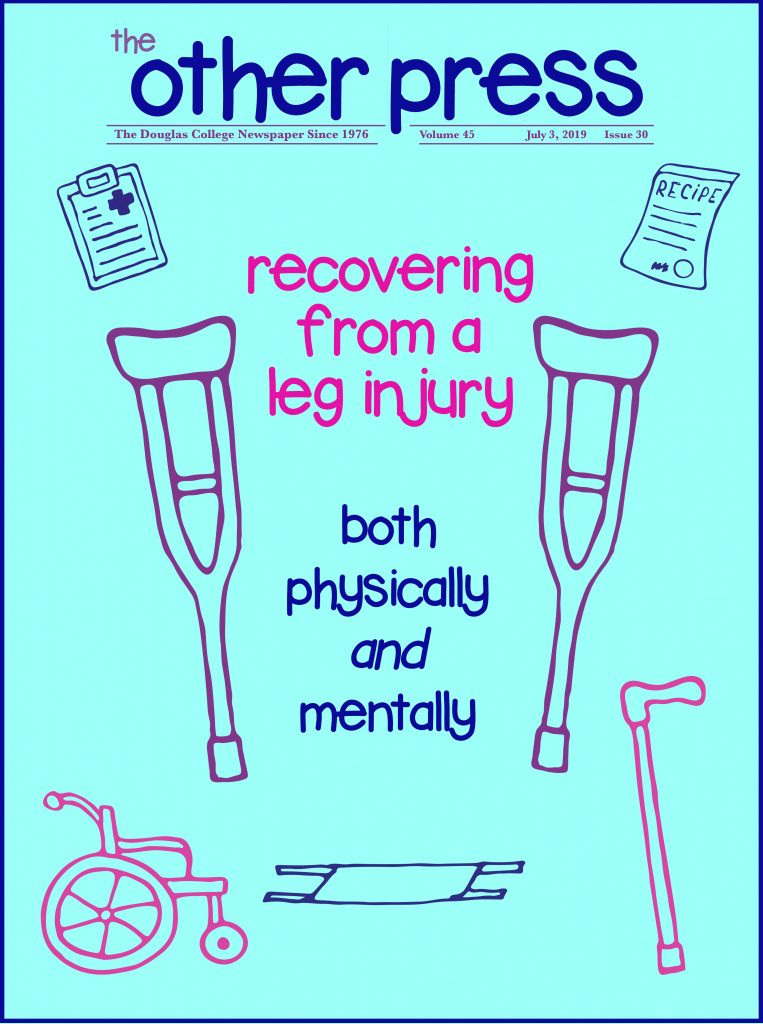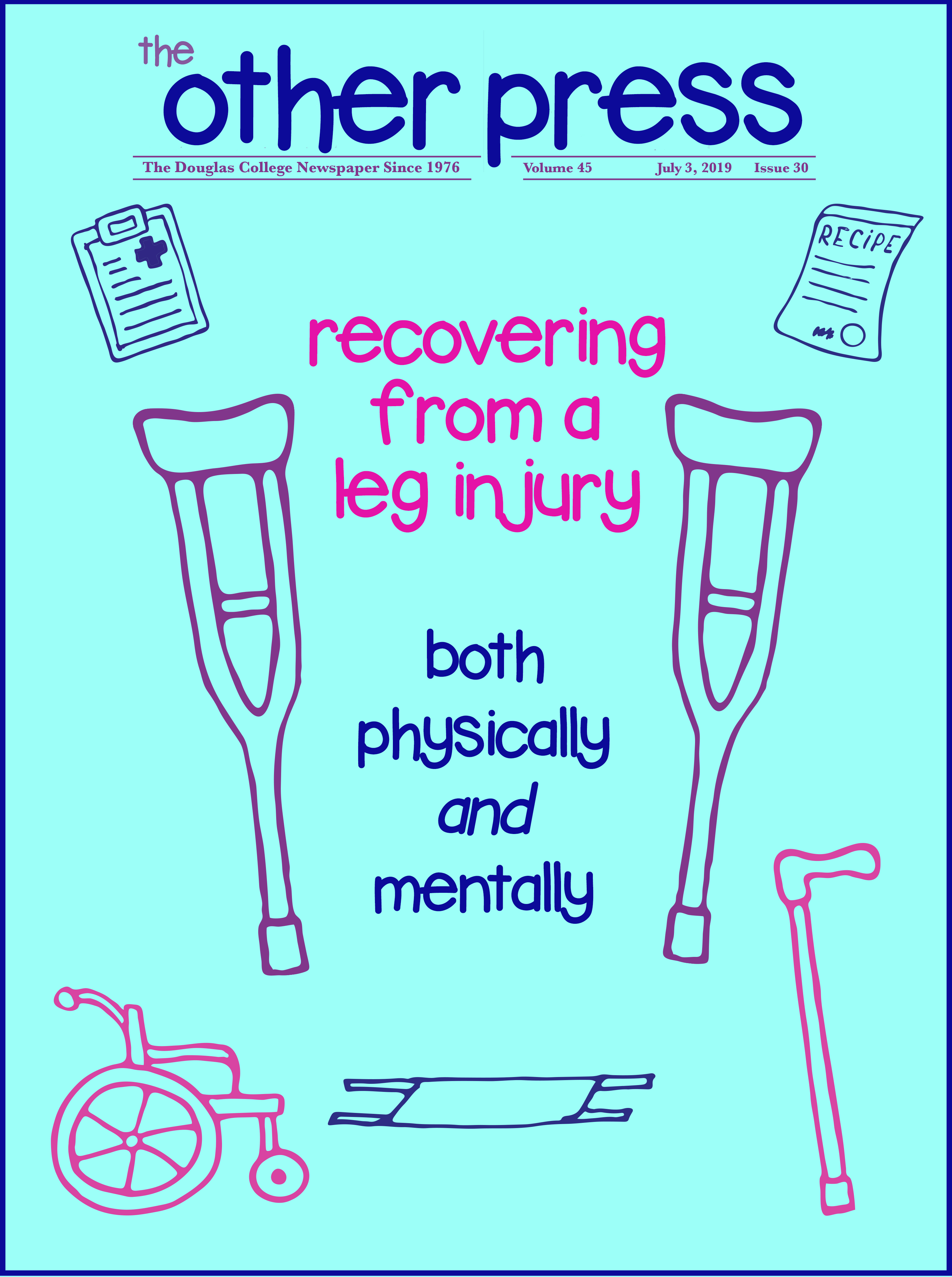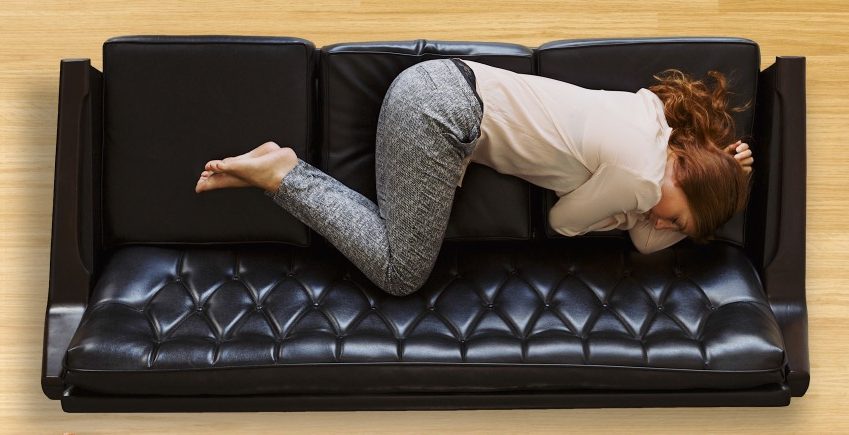
Coping and recovering after a foot injury
By Morgan Hannah, Life & Style Editor
I’m currently transitioning out of my third set of crutches after having a minor foot surgery that almost cancelled my summer plans to travel to Indonesia. But that’s not even the worst part! Relapse. Restlessness. Rehabilitation. These are the three Rs that I go through each time my feet fail me, which seems to be far more often than this 23-year-old Energizer Bunny can handle. At the risk of sounding dramatic, let me explain a bit about my previous injuries and how they always seem to be about my feet.
One time at writing camp I participated in a rainbow parachute game—you know the one, you’ve all played Cat & Mouse with that colourful canopy at least once. Only this time, we decided to try out a different game, a flying game. The object was clear: Someone sits in the centre of the parachute and everyone else grabs a handful of rainbow rayon and walks around in a circle, wrapping up the victim—er, I mean participant—in the centre. Once the participant in the middle is fully wrapped up, the outsiders pull back and send the centre-sitter spinning and flying upwards. Simple enough. Well, when it was my turn, something bad happened. I didn’t fly. I didn’t even spin. I just ungracefully tumbled forward over my foot and heard a pop that I didn’t give much thought to at the time. Conveniently after my turn, it was time to clean up and move on. Only I couldn’t move on, much less move at all. Without knowing it at the time, I had effectively fractured the top of my left foot.
The second break wasn’t any better. I always seem to injure myself in the least cool of ways, not that there really is any cool way to injure oneself. I’m just never left with any badass stories to tell involving helicopters or saving puppies. My boyfriend and I went to Extreme Air Park in Marlborough, Calgary where we bought two hours of trampoline bouncing. Sounds like fun, right? I mean, the walls and floors were covered in trampolines and there were foam pits and dodgeballs! It can’t get better than that, can it? But yes, it did. If you consider it “fun” to jump off a trampoline with a twist, land into a foam pit with a broken cuboid bone, have the fire department called to fetch you out—we’re talking five firemen and a gurney—then be told that I was the only person in Canada to break a bone in a foam pit, then yes, it got better. A tank of laughing gas, the disenchanting combo of an air cast and crutches, and six months later, I found myself with one atrophied leg and a permanently stained but healed foot. Plus, I now know what a cuboid bone is!
Luckily enough, this third time was not a break but rather a cut, and on the opposite foot as the other two incidents. Still not a cool injury though, since I had to have a huge infected boil right on the arch of my foot lanced. Talk about tender! The crutches were almost unnecessary this time around but seeing as my rolling office chair couldn’t fit outside of my apartment in order to get me to class, I had to accessorize with my least favourite accessory. At least the healing period is guaranteed to be quicker this time.
Each of these incidents had one thing in common—changing who I am as a person in a rather fundamental way. What am I talking about? Well, besides making me immobile and grouchy, my habits and activities have to change, and not for the better. I don’t watch TV; I haven’t for over half a decade. However, when I’ve run out of books to read and pictures to draw, and haven’t seen the sun in a couple of weeks, and my friends effectively ghost me (don’t worry, we made up), what is there left to do but torrent some movies, grab some snacks, and sit back? You might be thinking, what have I got to complain about? That sounds pleasant! To some readers it might be, but I’m the type of person who likes movement and organization, and I have a certain amount of energy I need to burn each day. I like to dance around my apartment—and everywhere for that matter—as soon as a song comes on. My body just starts to shake to the rhythm. I can’t help it!
Another fundamental change that affects me as a result of foot injuries is going from nine hours of intense exercise per week to barely shaking a limb in an effort to keep it from complete atrophy. On a normal week I go to the gym three times, which means I walk an hour to the gym, participate in an hour of cardio and kickboxing combined, then walk for an hour to get home. And I still have energy afterwards! Even my diet changes. I shouldn’t have found myself surprised this time around, but crutches and meal prepping simply don’t mix. From having to tie bags to my crutches in place of being able to use my arms, to having to make multiple trips just to get objects from one place to another in my apartment when I could’ve normally done it all in one trip—it’s exhausting! Yet short of having someone around to do it all for you, there’s really no way around this.
Not being able to participate in what is normal for me also affects the mind. Exercise is incredible for clearing the mind and keeping it clear; psychiatrists often dole out advice that living a healthy, balanced life to maintain excellent mental health includes routine, eating right, and movement (lots of movement)—so when you’re isolated, not eating right, and with limited movement, that takes a toll on mental health as well as physical health. In a compromised situation, what can you do? The truth is, not a whole heck of a lot, and good ol’ Google isn’t of much help either. A simple search of what one can do with a foot injury produces results such as colouring and drawing, watching TV, reading books, taking naps, playing board games, and the ever-elusive “learning something new.” For me, the “learning something new” was how exactly to create a D&D character. I’m now ready to tackle worldly adventures as a High Elf, seeing as my human form is currently out of commission.
If you were hoping to learn of ways to bypass the three Rs that accompany a foot injury, I’m sorry to have to disappoint you. I disappointed myself, too. All I can do is stress how important it is to maintain as much normalcy as possible—keep getting up, getting dressed, and getting as active as you can.
Wash your face in the morning (or whatever it is that you do), even when you feel like there’s no point. Put on an outfit that makes you feel fine AF even if no one sees you in it. Eat healthy meals, even when it’s more convenient to just grab a bag of chips. Don’t be afraid to lean on family and friends more during this time—figuratively and literally. They should be able to help you out through prepping healthy meals and keeping you company when they’re not at work. Listen to music. It can help keep you calm, happy, and even help to heal symptoms of depression and anxiety by reducing your heart rate, blood pressure, and cortisol levels, according to Psychology Today. Elevate your foot as often as possible, switching out hot and cold packs to help with circulation and healing, and when you’re not elevating your foot, move it!
Exercise as much as you can, so long as it doesn’t hurt. According to the site Quick and Dirty Tips, atrophy can occur in as little as 72 hours, so maintaining muscle use as best as possible is a must-do! Try leg lifts and bicycle motions, or push-ups from the modified knee position. Even just rotating your ankle and flexing your calves will make a difference. Just wiggle! Plus, make sure to also rest. The Chicago Tribune suggests that sleep helps wounds heal faster as the body produces more white blood cells that attack viruses and bacteria during times of rest.
Once you shed those crutches or that cast and you’re capable of walking again, try not to do too much too quickly, since your foot may swell up. Have patience for the slower pace of walking your body will likely be forced to endure for a couple of weeks; this is natural and so is the pulling sensation in the back of your thigh. Regular physio appointments can help get you up to speed again.
At risk of making a bad joke (like taking things step by step), all I have left to say is keep your chin up, find gratitude in the day-to-day, make goals and plans for when you’re all healed up, and never take a day for granted—because you never know when you’ll be down for the count next.


